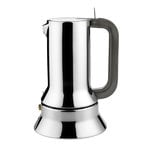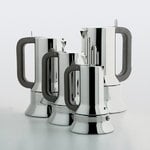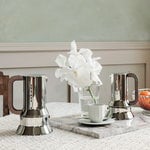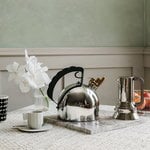Alessi’s Espresso coffee maker 9090 has a special role in the company’s history: it is not only their first espresso coffee maker but also the first object to win the prestigious Compasso d’Oro award and the first Alessi item in the permanent collection of MoMA in New York. The espresso coffee maker, designed by Richard Sapper, features a beautiful body made of stainless steel and brings timeless elegance to kitchen and table settings.








Espresso coffee maker 9090, 3 cups
Alessi
Description
Alessi’s Espresso coffee maker 9090 has a special role in the company’s history: it is not only their first espresso coffee maker but also the first object to win the prestigious Compasso d’Oro award and the first Alessi item in the permanent collection of MoMA in New York. The espresso coffee maker, designed by Richard Sapper, features a beautiful body made of stainless steel and brings timeless elegance to kitchen and table settings.
Product details (6)
- Material
- Stainless steel
- Height
- 17.5 cm
- Diameter
- 11 cm
- Capacity
- 15 cl
- Measurement details
- 15 cl = 3 cups of espresso
- Notes
-
Suitable for induction hobs.
Please check your induction stove's required minimum bottom diameter for the pot to make sure the espresso maker is compatible.
The black parts should not be washed in the dishwasher.
- Product ID
Designer
Richard Sapper (1932–2015) was a German industrial designer whose work combines simple shapes with interesting technical innovations. During his long career Sapper was awarded with the Compasso d’Oro design award for ten times, and his work is included in the collections of many museums – New York’s MoMA owns almost 20 designs from him. Some of his best known designs include the portable Doney 14 transistor TV from 1962, the Tizio lamp designed for the Italian design company Artemide in 1972 and IBM’s ThinkPad 700C from 1992. Besides working as a designer, Sapper was also a lecturer in many universities wordwide.
View all productsReviews (2)
4.5
Based on 2 reviews
-
R
Roger B
Parkersburg, United States
The Alessi 9090 makes a terrific cup of coffee, and looks equally terrific while waiting to prepare the next one. It did take a bit of time to be delivered as there's evidently no easy trip between Helsinki, Finland and Vienna, WV, USA. But it was extremely well-packaged and arrived in mint condition.
265 days ago
-
A
anonyymi
130 days ago
Sustainability
The Product Sustainability Framework, our criteria of sustainable design, helps you find the most sustainable products in our selection. Read below which sustainability criteria this product has met.
Working conditions & labour 8/9
-
Equal opportunities for all employees
-
Commitment to UN Global Compact, fair compensation for all employees
-
Corporate responsibility requirements defined and communicated for suppliers
-
Systematic work for improved inclusion and well-being in the workplace
-
Transparent supply chain
-
Suppliers' compliance to a code of conduct ensured
-
Direct suppliers audited and certified
-
Compliance to the UN Guiding Principles on Business and Human Rights ensured in the supply chain
-
Support for community involvement in the supply chain
Eco-friendly production 8/9
-
Fair and resource-wise water-use in production
-
No incineration or landfilling of returned items
-
No use of endangered species as materials
-
No direct environmental emissions or waste (excl. GHGs) from production
-
The sustainability of direct suppliers' production is addressed and monitored
-
Production and material sourcing that respect biodiversity, animal rights, and natural ecosystems
-
Material-efficient and ecological packaging
-
No potentially harmful chemicals used in own production
-
Positive impact on nature’s well-being through operations that regenerate natural ecosystems
Climate impact 4/8
-
Company's direct greenhouse gas emissions identified and commitment to reduction
-
Product's carbon impact identified and commitment to reduction
-
Guidance on energy- and eco-efficient use of the product
-
Carbon footprint of the product calculated and goals set to reduce it
-
Contribution to climate initiatives beyond the brand’s direct operations
-
Low-carbon or compensated transportation
-
100 % renewable energy in own production and operations
-
Carbon neutral or carbon negative product
Sustainable materials 5/6
-
Sustainable and long-lasting material choices
-
No harmful or hazardous substances
-
Responsible raw material sourcing and production
-
Materials suited for circularity: monomaterials, recyclable finishings, renewable or recycled contents etc.
-
Ecological materials: natural, biodegradable, recyclable or recycled contents
-
Outstanding materials in terms of innovativeness, responsibility, sustainability and circularity: local production or sourcing, 100 % recycled content, C2C-certification etc.
Circular design 5/5
-
High aesthetic quality promoting long-term use of the product
-
Technically durable product design and material choices
-
Design for enduring life-long quality
-
Design and support for product maintenance, repair and upgradability
-
Innovative circular design solutions: circular service system, resale platform, remanufacturing, collection of used products, etc.









